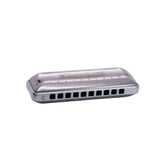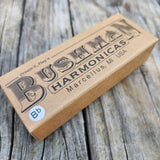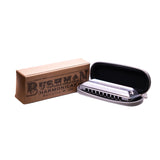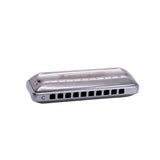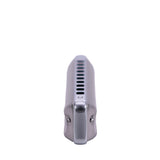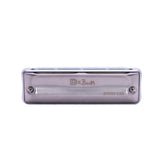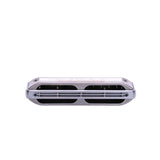Bushman John Lee Steelie Harmonica Includes Free USA Shipping
I love this harmonica! It’s so special – the way it feels, the way it plays, the way it sounds – that it deserved the very best name. I named it after 3 important men in my life – John Lee Curtis aka Sonny Boy Williamson I (March 30, 1914 – June 1, 1948) the founding father of blues harmonica, John Lee Hooker (August 22, 1917 – June 21, 2001) my favorite bluesman, and John Lee Hall, (February 25, 1944 – January 23, 2022) my father who instilled in me a never-ending love for music.
The John Lee is the first harmonica ever to feature Smoothie Cover Plates. The brushed stainless steel covers are not painted or powder coated – they’re just completely slick, making for a super comfortable, super fast harmonica. The hole numbers are positioned out of the lip zone to improve comfort and slickness even more. There’s a deep finger valley in each cover plate for your index finger and thumb to lay in while holding it. The finger valleys are not only comfortable, they keep the instrument right where you want it. The ends of the Steelie’s polished aluminum comb are concave so the harmonica lays perfectly in the crotch between your index finger and thumb. There’s no other harmonica anywhere that offers this many comfort features, and then you have the playability! The easy, loud, fast, sound it produces seems magical – like it’s impossible. I’ve never experienced a harmonica that bends so easy – draw bends, blow bends, over blows – whatever you call on it to do, it does! The harmonica technicians who make the John Lee use an easy-bender reed gap recipe that makes those bends possible right out of the box, with no customization or adjustments necessary. All I can say to them is, Namaste! The John Lee Steelie features a polished aluminum comb whereas the John Lee Original which features a plastic comb.
The John Lee Steelie has an Equal Temperament
Available in 13 keys including the 12 major keys plus Low F.
| Weight | 6 oz |
|---|---|
| Dimensions | 5 × 2 × 1 in |
| Keys |
A, Ab, B, Bb, C, D, Db, E, Eb, F, F#, G, Low F |








